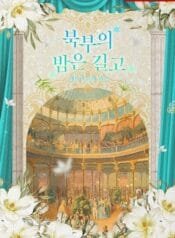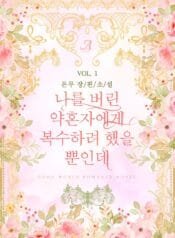“The children of Count Parden must be terribly busy. They’re already leaving…”
At someone’s remark, the gathered guests all turned to glance toward the entrance of the hall. A woman in a sky-blue dress was walking out with a dark-haired man, heading straight for the doors.
“She walked in with her nose in the air, and now she’s leaving just the same. Not a single word of greeting to anyone—honestly…”
“Well, what do you expect? No matter how impressive they are now, they were commoners just a hundred years ago. Manners and refinement just aren’t in their blood.”
No sooner had the pair disappeared than the voices grew louder. Their mockery was blatant, but most in the group laughed in easy agreement.
“All the money in the world can’t buy the kind of elegance that comes from generations of breeding.”
“Absolutely right. Ho ho.”
“In the old days, they wouldn’t have even been allowed to set foot on the same ground as us. The world really has turned upside down. Tsk.”
As the conversation grew increasingly inappropriate, a few in the hall frowned and shot the group disapproving looks. But while there was discomfort, no one dared speak up.
The ones mocking the departed guests were the most influential figures at tonight’s party. Centered around Duke Levantus, they formed a core of the capital’s old aristocracy—most hailed from long-established central noble families and were commonly called the Old Nobility.
Though some held lands in the provinces, these Old Nobility had long since settled in the imperial capital, becoming the city’s entrenched elite. Aside from the emperor and the royal family, they had little to fear. Yet in recent decades, their privileged position had been threatened by a new force: so-called “new nobles”—families recently added to the nobility rolls, their status earned through great wealth.
“What can you do? It’s the law. I have the deepest respect for the late Emperor Nicholas I, but on this matter…”
“Ahem! Be careful what you say. He was still the former emperor. If the wrong ears hear that, you could be in trouble.”
The rise of the new nobility dated back about a hundred years, to the reign of Nicholas I. As the empire focused heavily on trade, the emperor took a proactive stance in both domestic and foreign affairs.
“It is the merchants, those who risk all in the unseen wars of commerce, who are our vanguard. I shall see they are justly rewarded.”
Nicholas I honored those merchants and untitled nobles who achieved great success in trade, calling them the true supporters of the national treasury, and granted them noble rank and titles. It was a shocking move—so unexpected that even the recipients were left stunned.
In truth, only a select few ever received the emperor’s recognition, but the precedent sent shockwaves through society. Ambitious merchants threw themselves into trade with renewed fervor. Many failed, but some achieved astonishing success and transformed their lives.
“This is silk from across the sea in Lupchen—a blue you’ll find nowhere else! Just drape this over your shoulders and you’ll shine that much brighter.”
“This is horn from the desert beasts of Sidiu. Grind it into powder and any cough will vanish…”
As commerce thrived, the empire grew wealthier than ever. People enjoyed more prosperous lives, and the royal family’s popularity soared.
“What is this… This could shake the very foundation of the empire!”
“At this rate, market vendors will be lording it over us!”
But not everyone welcomed Nicholas I’s policies. The old nobility, especially those who had enjoyed every privilege by birthright, fiercely opposed them. They could not accept that commoners—who, just the day before, would not have dared meet their eyes—or untitled country nobles, were now, at least in the eyes of the law, their equals.
“Your Majesty, please reconsider.”
“Duke, I don’t see what the problem is.”
“Every person is born with their station in life. No matter what great deeds they achieve, that can’t be changed!”
“If you say that, aren’t you putting yourself in a difficult position, Duke? After all, didn’t your own ancestors—who served alongside my forebear, the first emperor—start out as mere tanners? It’s recorded in the history books. Don’t tell me you didn’t know.”
“Your Majesty!”
Despite the fierce opposition of the old nobility, Nicholas I remained resolute. When it became clear that he would not yield, the powerful old nobles began to express their displeasure through action. More than half of the nobles refused to attend palace meetings, and on days when the emperor held banquets, their leader, Duke Levantus, hosted a rival gathering at his home, further widening the divide.
Meanwhile, Nicholas I quietly built his own support base. He drew the merchants he had ennobled into his circle, as well as provincial nobles who had long been overshadowed by the old guard and clever, ambitious young nobles without titles. By the time the term ‘new nobility’ began to circulate, trouble was already brewing.
“A terrible incident, Your Majesty! A ship that set sail from Haran sank just as it left imperial waters. But the one behind this…”
A ship had departed from the bustling port city of Haran, only to be attacked and sunk the moment it left imperial territory. It was broad daylight, and with many merchant ships nearby, there were dozens of witnesses. Yet no one panicked.
“No need to make a fuss. It’s obvious who did it—Count Logue, as always. His temper, honestly… Tsk.”
Back then, incidents like these were common. Some among the old nobility, especially the more extreme, expressed their dissatisfaction with the emperor by attacking and sinking merchant ships. They used mercenaries in secret, and typically targeted small, newly established trading companies, so most cases faded away without consequence.
Despite the Emperor encouraging trade, it was difficult for any merchant to bring a case against such powerful nobles without solid evidence. Consequently, most incidents were dismissed as pirate attacks, just as the perpetrators intended. However, there was a special passenger aboard the sunken ship that day…
“He might be reckless, but sometimes you need a man like the count. Someone has to stand up to injustice if the world’s going to set itself right again.”
“That’s not the issue! The ship that sank was carrying His Highness, the Third Prince!”
“What?”
The emperor’s third son, Prince Cassius, died when the ship sank; his body was never recovered. Enraged by his son’s death, the emperor launched a sweeping investigation.
“There have been dozens of deaths like this! Count Logue! Do you admit your crimes?”
“Y-Your Majesty, no! I… that matter—”
Before even a month had passed, Count Logue—a key member of the old nobility—was named the culprit. The investigation was swift, the evidence convenient, the culprit caught all too easily. Only then did the old nobles sense something was wrong, but in the face of the prince’s death, no one dared speak out.
“Why was His Highness the Third Prince on that ship in the first place?”
“They say it was by His Majesty’s command. To observe and learn about trade firsthand…”
“Trade, on such a small merchant ship? Does that make any sense? Besides, His Majesty never even truly acknowledged the Third Prince as his son. Why, the Empress herself—after only seven months—”
“Shh! Quiet! Are you trying to get yourself killed? If you want to lose your head, do it alone. This isn’t the time to be reckless with your words.”
Inside the council chamber, the emperor seemed ready to draw his sword at any moment. In the end, Count Logue was sentenced to death. Every member of his family was executed or demoted to slave status and exiled to the frontier.
After Count Logue’s execution, the old nobility naturally withdrew and kept their heads down. And into that void, the new nobility slid with ease—wealthy and backed by the emperor’s favor, they grew in power far faster than anyone had expected, quickly becoming one of the main pillars of the empire’s aristocracy.
“I suppose the duke is right on this point.”
“Y-Your Majesty…”
Once the new nobles’ power was secure, Nicholas I no longer supported them as openly. In fact, he sometimes sided with the old nobility.
And so, before anyone noticed, the emperor would simply sit on his throne, tapping the armrest, watching as the nobles raised their voices at each other. Everyone knew his lazy yawns were the mark of a man confident in his own victory.
“Whoever has the emperor’s favor wins. What are we, chess pieces?”
With the old and new nobility locked in rivalry, it was only natural that the imperial family rose to the top of the imperial hierarchy. Having stepped off the scales themselves and taken up the role of the balance, the royal heirs were more revered than ever.
Even after Nicholas I’s death, little changed. The imperial family continued to keep the two factions in check, skilfully managing their conflict. The old nobility, knowing the royal family’s intentions, lacked the generosity to extend a hand to their rivals. Meanwhile, the new nobles, lacking deep roots, had no opportunity to demonstrate magnanimity.
“Lowborn, classless upstarts…”
“Leeches living off their birthright…”
The two factions were too busy attacking each other to do anything else. No one could say how things would be in the distant future, but for now, that was the state of things.
“Well… there’s nothing to blame the late emperor for. He only bestowed those rewards out of generosity. The problem is those people who, ignorant of their place, turn that generosity into arrogance.”
“Exactly. When you receive a reward you don’t deserve, you ought to show a little humility… not go around flaunting your money like some vulgar upstart.”
The mockery that Aisha and Daniel endured at the hands of the old nobility as they left the party was just another manifestation of the ongoing power struggle. As the children of Count Parden — the leading figure of the new nobility — the Parden siblings were essentially the enemy. Moreover, Count Parden had just dealt the old nobles a serious blow.
In truth, the old nobility had shown a far greater turnout at this orphanage charity event. As there were still few new nobles with enough influence to participate in central politics, it was only natural that Duke Levantus, the leader of the old nobility, had ordered his followers to attend the event and assert their dominance.
“What else can they do besides flaunt their money? It’s the only thing they have.”
“Haha. Couldn’t have said it better. Without their money, they’re nothing.”
However, Count Parden’s enormous donation thwarted the old nobles’ plans. Although the old nobles contributed more in total, Count Parden was awarded the title of greatest contributor. Upset by this blow to their pride, the old nobility became hostile at any mention of the Parden family.






